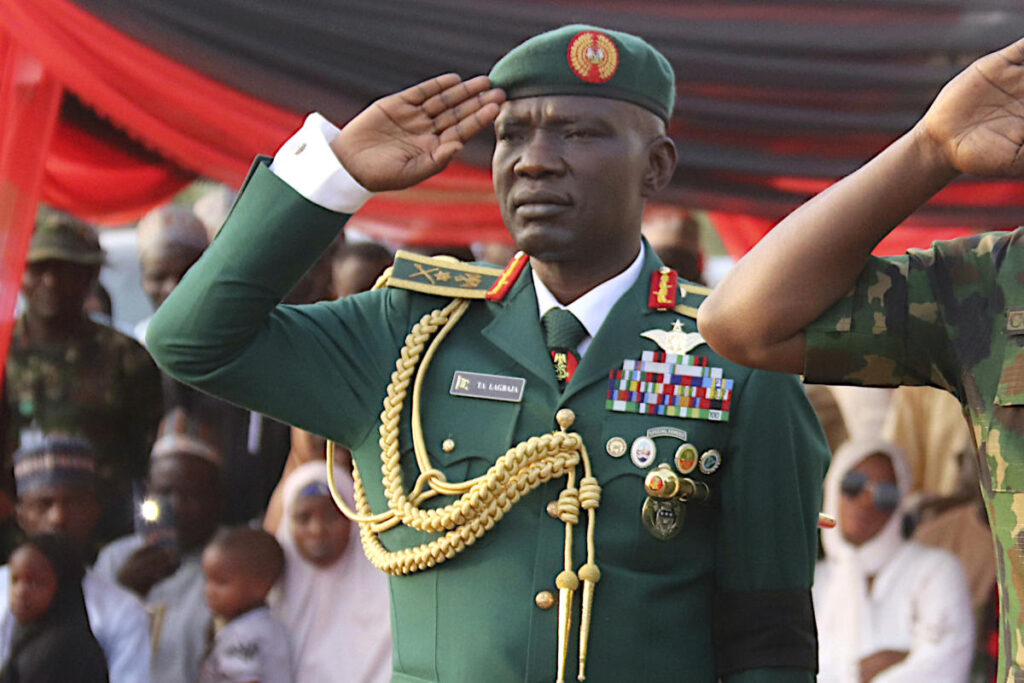The recent death of Nigeria’s army chief, Lt. Gen. Taoreed Abiodun Lagbaja, marks a significant moment in the nation’s ongoing struggle against Islamic extremism. President Bola Tinubu announced that Lagbaja, who had been serving as army chief since June 2023, passed away in Lagos after battling an undisclosed illness. Notably absent from public engagements in the months leading up to his death, which had sparked rumors about his condition, his passing was confirmed only after his official replacement, Lt. Gen. Olufemi Oluyede, was appointed in an acting capacity about a week prior. Lagbaja was 56 years old and is now the second Nigerian army chief to die while in office within a short span, following the tragic death of Ibrahim Attahiru in a military crash in 2021.
Lagbaja’s tenure came during a crucial phase of Nigeria’s fight against militancy in the northeast, where Boko Haram has waged an insurgency for nearly 15 years. Although the intensity of violent attacks has diminished over time, the situation remains precarious as extremists continue to expand their influence in the region, particularly in the Lake Chad Basin. Underfunded and often outgunned, the Nigerian military has struggled to contain these groups, which have also been involved in widespread killings and kidnappings sanctioned by armed factions across the northern part of the country. Analysts emphasize that the fight against Boko Haram and other extremist groups is one of Africa’s longest and most challenging military engagements.
During Lagbaja’s stint as army chief, Nigeria grappled with immense challenges, including the deaths of over 11,600 people, including military personnel, due to violence associated with these security crises. Despite these grim statistics, Lagbaja had pledged to enhance discipline and professionalism within the military. Historically, the Nigerian army has faced scrutiny for alleged human rights abuses and extrajudicial killings, which Lagbaja aimed to address as part of his agenda for reform. His approach to leadership was embraced by many within the military hierarchy as well as civilians who sought accountability and improved standards of military conduct.
The loss of Lagbaja has elicited profound reactions from military and government officials alike. Defense Chief Gen. Christopher Musa expressed that Lagbaja’s death is a “tremendous loss” for both the military and the nation, praising his commitment to defending Nigeria’s sovereignty. Musa lauded Lagbaja’s contributions and dedication, indicating a recognition of the vital role he played during a tumultuous period for the Nigerian army and the broader security landscape. The morale of the military personnel is expected to be affected by this significant leadership change at a time when stability and direction are crucial.
As Nigeria grapples with multifaceted security challenges, including the resurgence of extremist factions and the relentless cycle of kidnappings for ransom, the appointment of a new army chief comes at a particularly pivotal moment. Lt. Gen. Olufemi Oluyede, tasked with acquiring continuity in leadership amid a crisis, will be expected to build on Lagbaja’s legacy while addressing ongoing military and humanitarian issues. The new leader will need to prioritize both the tactical demands of the counter-insurgency effort and the restoration of public trust in the military, which has been strained by past allegations of misconduct and ineffective responses to security threats.
In conclusion, the death of Lt. Gen. Taoreed Abiodun Lagbaja underscores the difficulties faced by Nigeria’s military in its ongoing battle against extremism. As his successor takes on the mantle of leadership, there is a pressing need for innovative strategies to tackle the persistent violence and instability in the region. While the military has made strides in curtailing the influence of Boko Haram, the replacement of leadership also serves as a reminder of the urgency required to evolve and adapt in order to secure the nation’s safety and ensure the well-being of its citizens amid a climate of fear and uncertainty.

